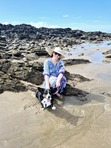Theresa Smith's Blog, page 66
September 18, 2020
The Week That Was…
September school holidays!
That is all…
[image error]
~~~
Joke of the week:
[image error]
~~~
Book of the week:
[image error]
~~~
What I’ve been watching:
[image error]
Just as good as the first! This was a terrific movie to watch with my 14 year old son. We both really enjoyed it.
[image error]
New episodes of this have begun to drop and I like it still, four seasons in. Plus, weekly episodes prevent bingeing so I am still reading instead of getting sucked into TV land, as is my way.
~~~
What I’m reading right now:
[image error]
~~~
Until next week… 
September 15, 2020
Book Review: Black Rabbit by Angus Gaunt
Pompous, pampered Maurice thinks he has his life sorted out. But when he meets a stranger at the funeral of his maiden aunt, he is taken on a bizarre journey of self-discovery that sends him to places people like him are not supposed to go. Angus Gaunt’s nasty little novel is about a man who stumbles towards a kind of redemption as he absents himself from society.
[image error]
Not much is given away in the blurb for this novel so reading it was a revelatory experience, and one I enjoyed immensely. The story opens at a funeral for an elderly aunt where Maurice and his sisters are attending what they have obligatorily organised. As they get into the family funeral car, a stranger is sitting in there and they have no idea how he is connected to their aunt, nor is the stranger at all forthcoming with the details.
This opening is at once intriguing, but it’s the writing style of Angus Gaunt that really drew me in. He has such a command over his words and the way he arranges them is exact, giving and taking on a need to know basis. It’s such a sought after skill, that ability to give enough to the reader so they feel assured they know what’s happening, but holding back, allowing the reader the opportunity to see for themselves without having to have everything laid out and explained for them. It goes beyond ambiguous endings and is more about crediting the reader with intelligence. I liked that about his writing, very much.
This novel is darkly funny, the kind of humour I like best: sarcastic, satirical, clever. It walks a fine line that occasionally puts a toe into the preposterous, particularly as the ‘stranger’ ingratiates himself more and more into Maurice’s life. Maurice himself is on a downward spiral, things are going bad for him, both personally and professionally. It was beguiling to witness the trajectory of Maurice’s fall, and moreover, the path to his…let’s just call it a redemption. Nothing within this novel is as you would expect, which just makes it all the more delightfully sinister. I’d love to see this one adapted into a film, I think it would be brilliant.




Published by Ginninderra Press
About the Author:
Angus Gaunt is an Australian novelist and short story writer. He lives in a northern outpost of Sydney, with his partner Meredith, and together they run Sappho Books.
Find out more about Angus Gaunt here
September 13, 2020
Book Review: The Lying Life of Adults by Elena Ferrante
Translated by Ann Goldstein
About the Book:
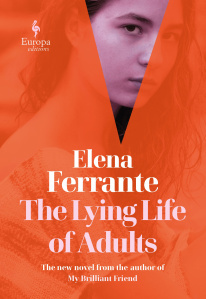
A powerful new novel set in a divided Naples by Elena Ferrante, the beloved best-selling author of My Brilliant Friend.
Giovanna’s pretty face has changed: it’s turning into the face of an ugly, spiteful adolescent. But is she seeing things as they really are? Into which mirror must she look to find herself and save herself?
She is searching for a new face in two kindred cities that fear and detest one another: the Naples of the heights, which assumes a mask of refinement, and the Naples of the depths, which professes to be a place of excess and vulgarity. She moves between these two cities, disoriented by the fact that, whether high or low, the city seems to offer no answer and no escape.
My Thoughts:
I really enjoyed this novel. I have only read My Brilliant Friend (which I loved) and the second one in that quartet (which I didn’t love), so I wouldn’t say I’m a super fan of Ferrante, but I enjoyed her writing from those two previous reads, and the Neapolitan atmosphere she infuses into her work is second to none. I was very keen to read this new novel as a way of deciding, outside of the quartet, whether I had it in me to become a Ferrante super fan, and I think it might be on the cards. The Lying Life of Adults is instantly recognisable as Ferrante, her writing is distinctive and that atmosphere I mentioned above is just instantly there, almost tangible in its presence. The characters are complex and highly emotional, I think this is a cultural thing, let’s call it the Neapolitan way of being, and the story, whilst not overly complicated, was entirely engrossing. A coming of age, yes, but also a fully fleshed out story of a family in crisis and the way in which the toxicity of one person can have such far-reaching consequences, in this case, causing intergenerational upheaval within four families.
There were a few things I found a bit icky, and maybe it can be attributed to a difference in culture, but the amount of older men having sex with very young teenagers was a bit disturbing. Sometimes they were men in their early twenties dating young teenage girls, but other times it was married men in their forties and fifties having sexual encounters with them so that they could get the whole business of losing their virginity over and done with. It might be the Neapolitan way, but it is also statutory rape and an abuse of power, yet no one seemed to have an issue with it. Also, I found the friendship between Giovanna and Angela confusing, there were sexual overtones from a young age yet neither of the girls claimed to be lesbians. It almost seemed like it was just a thing you did, make out with your best friend all the time until you reach an age where you can use a boy instead. I kept waiting for an exploration of this, within the context of this being a coming of age story, yet it seemed par for the course. These things, to me, were abrasive, a sort of roughness that when paired with the smooth beauty of Ferrante’s prose, seem to convey a signature style. In Vittoria, Giovanna’s aunt, we have a woman who is so extreme in her emotions and conduct, so manipulative and yet so needy. I really appreciated watching this path that Giovanna seemed to be intent on walking, following in her aunt’s footsteps with deliberate intent, yet at the same time, attempting to forge her own way. I was very much holding my breath, begging her not to just become a new version of Vittoria for the next generation to deal with.
I’m not sure if there are plans for this to become a series. It finished with sense of openness, there could definitely be more, but in equal measure, things wrapped up well. All in all, if you enjoyed My Brilliant Friend, you’ll probably enjoy this as well. I certainly did. It is aptly titled, and we see, right the way through, just how much lying goes into adulting, both to others and ourselves, and more pertinently, the way in which our offspring see this and form their own opinions about it.




Thanks is extended to Allen & Unwin for providing me with a copy of The Lying Life of Adults for review.
About the Author:
Elena Ferrante is the author of The Days of Abandonment (Europa, 2005), Troubling Love (Europa, 2006), The Lost Daughter (Europa, 2008) and the four volumes of the Neapolitan Quartet (My Brilliant Friend, The Story of a New Name, Those Who Leave and Those Who Stay, and The Story of the Lost Child), published by Europa Editions between 2012 and 2015. She is also the author of a children’s picture book illustrated by Mara Cerri, The Beach at Night, and a work of non-fiction, Frantumaglia: A Writer’s Journey. Incidental Inventions, her collected Guardian columns, was published in 2019.
[image error]
The Lying Life of Adults
Published by Europa Editions
Released 1st September 2020
September 11, 2020
#BookBingo2020 – Round 9: Set in a place you dream of visiting
[image error]
Chile is like its own character, with just as much presence as Victor or Roser within any scene. This is a novel that is so enriched by culture, love, compassion, and loyalty. Reading it was a joy that I was reluctant to let go of.
Visit my full review of this book here.
[image error]
I’ve teamed up once again with Mrs B’s Book Reviews and The Book Muse. It’s going to be a little different for 2020, the card has less squares, allowing us to run bingo on the second Saturday of each month. Also, for the first time since beginning bingo, I haven’t specified genre, type, or even fiction or non-fiction for the categories. 2020 is all about themes, and from there, the choice is wide open.
Hope to see you joining in! If you want to play along, just tag us on social media with your bingo posts each month. You can also join the Page by Page Book Club with Theresa Smith Writes over on Facebook, where we all post in the same place on the same date and chat over each other’s entries. Alternatively, drop a link each month into the comments of my Saturday bingo post so I can follow your progress blog to blog.
#BookBingo2020
September 10, 2020
The Week That Was…
I have a new dishwasher! Break out the bubbly! It’s been since the end of July and that is really WAY TOO LONG to have to wait for a shop to get what you ordered and paid for in, but the service in Harvey Norman out here is a whole other story and it’s got nothing to do with Covid.
~~~
Joke of the week:
[image error]
It feels like a two joke week, so here’s another that put me in mind of my dog:
[image error]
~~~
What I’ve been watching:
[image error]
Fans of the 80s movie roll on up! This is a revamped version for our modern, digital age with a specific focus on teen suicide, school shootings and school bombings, and a whole host of other issues woven into a dark, comic, yet entirely on point shock fest. I loved this show so much, as nasty as it is, it hits all the right points with force. I read online that it was dumped on the internet because no network in America would touch it. America is particularly good at gagging its artists when they apply a critical gaze to its society. This show is a case in point. You can find it on Stan if you’re keen. If you’ve already seen it, what did you think?
~~~
What I’m reading right now:
[image error]
~~~
Until next week… 
September 9, 2020
Quick Shots Book Review: A Lonely Girl is a Dangerous Thing
About the Book:
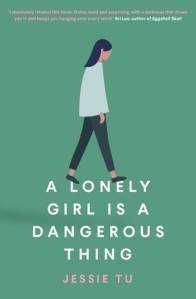
Growing up is always hard, but especially when so many think you’re a washed-up has-been at twenty-two.
Jena Lin plays the violin. She was once a child prodigy and now uses sex to fill the void left by fame. She’s struggling a little. Her professional life comprises rehearsals, concerts, auditions and relentless practice; her personal life is spent managing the demands of her strict family and creative friends, and hooking up. And then she meets Mark – much older and worldly-wise – who consumes her. But at what cost to her dreams?
When Jena is awarded an internship with the New York Philharmonic, she thinks the life she has dreamed of is about to begin. But when Trump is elected, New York changes irrevocably and Jena along with it. Is the dream over? As Jena’s life takes on echoes of Frances Ha, her favourite film, crucial truths are gradually revealed to her.
A Lonely Girl is a Dangerous Thing explores female desire and the consequences of wanting too much and never getting it. It is about the awkwardness and pain of being human in an increasingly dislocated world – and how, in spite of all this, we still try to become the person we want to be. This is a dazzling and original debut from a young writer with a fierce, intelligent and audacious voice.
My Thoughts:
After listening to Jessie Tu in conversation with Alice Pung at #MWFDIGITAL, I was compelled to read this novel and I’ll admit, my expectations were quite high.
Unfortunately, it did not measure up to the author talk.
There was far too much meaningless sex in this novel, and I’m not one to be prudish, but this was graphically explicit and quite often violent sex. Jena was so preoccupied with sex that it completely overshadowed anything else the novel had to offer. I found her interest in violent porn repulsive and really wish the author hadn’t felt it necessary to inject such vivid descriptions of it throughout the narrative.
Not for me, this one. I can’t even say it redeemed itself with character growth. Jena was pretty much the same at the end as she was in the beginning.
Disturbing content.

[image error]
A Lonely Girl is a Dangerous Thing
Published by Allen & Unwin
Released July 2020
September 8, 2020
Book Review: Winter of the Wolf by Martha Hunt Handler
About the Book:
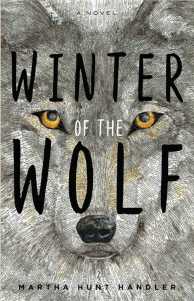
An exploration in grief, suicide, spiritualism, and Inuit culture, Winter of the Wolf follows Bean, an empathic and spiritually evolved fifteen-year-old, who is determined to unravel the mystery of her brother Sam’s death. Though all evidence points to a suicide, her heart and intuition compel her to dig deeper. With help from her friend Julie, they retrace Sam’s steps, delve into his Inuit beliefs, and reconnect with their spiritual beliefs to uncover clues beyond material understanding.
Both tragic and heart-warming, this twisting novel draws you into Bean’s world as she struggles with grief, navigates high school dramas, and learns to open her heart in order to see the true nature of the people around her. Winter of the Wolf is about seeking the truth—no matter how painful—in order to see the full picture.
In this novel, environmentalist and award-winning author, Martha Handler, brings together two important pieces of her life—the death of her best friend’s son and her work as president of the Wolf Conservation Center—to tell an empathetic and powerful story with undeniable messages.
My Thoughts:
I enjoyed this novel so much, and considering my somewhat shaky relationship with YA fiction, I was quite surprised from the get-go how much I didn’t want to put this novel down. It had everything: a compelling story, well fleshed out characters, depth and meaning, along with a sensitivity regarding what can only be considered as ‘big ticket’ issues. This might be marketed as a YA novel, but it’s really one that suits all ages, in my opinion.
Bean was a beautiful narrator, so honest and loyal. I enjoyed her family interactions and especially her relationship with her best friend Julie. This novel has a spiritual underpinning that appealed to me greatly. It raised a question that I hadn’t thought much about, to be honest, that of whether we need to be born into a culture in order to live by its rules. Bean’s brother Sam had decided from a young age that the Inuit life and beliefs were what he wanted to live by, even though he wasn’t Inuit himself. It’s like he chose it as his religion. I found that really interesting and quite thought provoking.
There are some heavy themes in this novel but they are handled with sensitivity and intelligence. This is one of those rare novels that walks the line between education and entertainment with perfect grace. Despite the grave beginnings, it soars to a hopeful finish that left me feeling fulfilled and inspired.




Thanks is extended to Greenleaf Book Group for providing me with a copy of Winter of the Wolf for review.
About the Author:
Martha Hunt Handler grew up in northern Illinois dreaming about wolves and has always understood that her role in this lifetime is to tell stories and be a voice for nature. She has been an environmental consultant, a magazine columnist, an actress, and a polar explorer, among other occupations. She has also driven across the country in an 18-wheeler and been a grand-prize winner of The Newlywed Game.
Soon after she and her family relocated from Los Angeles to South Salem, New York, she began to hear wolves in her backyard. This was the start of her twenty-plus-year career as an advocate for wolves at the Wolf Conservation Center, where she currently serves as Board President.
[image error]
Winter of the Wolf
Published by Greenleaf Book Group
Released 7th July 2020
September 7, 2020
Author Talks: Emma Ashmere with Writing Us In
My new short story collection Dreams They Forgot has been described as ‘a mix of history and imagination’, but not all these twenty-three stories are set in earlier times. Several use the past as an echo reverberating into the present day.
I’ve always been interested in the kind of people who don’t make it into the history books, so I was thrilled when I landed a research assistant job in the early 2000s. My task was to scout for women’s voices, through the lens of gender, cultural background, and class and gather material for two Australian gardening history books and another about women and empire.
I must have spooled through miles of dizzying microfilm and yellowing newspapers. Some days I’d unfold a beautiful map of a grand European-style garden adorned with fountains, follies, with paths wide enough to accommodate women’s crinolines. Other times I’d find letters to the editor haranguing ‘indolent’ labourers and their ‘slattern wives’ for not ‘improving themselves’ by gardening at night in their ‘spare time’. Or complaints about industrious ‘cottagers’ growing turnips on their front window sills instead of more polite daffodils. These glimpses of people’s concerns, predicaments, and aspirations formed pictures and questions in my mind. Who were they? Why did they chop down a neighbour’s prized walnut tree? Or spread pernicious rumours about their rivals – who happened to be Chinese market gardeners?
Sometimes I wept as I read letters reporting deaths to loved ones ‘beyond the seas’. I’d catch my breath at the cryptic reference to an Irish maid-servant ‘extinguishing herself in the Yarra’. I slowly turned the pages of stained diaries scrawled by a woman trying to run a farm on her own while her husband was away droving or securing their potential fortunes (or losses) at the diggings.
Some days the pickings were slim. Women historians know that when they enter the archive, the shelves are often bare.
But then I’d spy a racy tale about a ‘harridan’ working under multiple-aliases to avoid the police, advertising herself as a ‘mesmerist’ and ‘famed palm reader’ and once again I’d be lead down another beguiling library corridor by a mercurical woman with quick eyes and peacock feathers winking in her chestnut hair.
[image error]
Short Story Publications by Emma Ashmere
I drew on some of these finds in Dreams They Forgot. All of the stories as a mixture of memory, imagination, experience, with a hefty dose ‘what if.’ The brevity of the short story form means they can only open a small intense aperture into characters’ lives – like an eye pressed to the crack in a wall.
In ‘Nightfall’ an Irish immigrant finds a love in an Australian 1860s music hall, only to be caught up in sinister dealings with her physician employer. The protagonist in ‘Portrait or Landscape’ is a backpacker wandering Europe in the 1980s, plotting her exit from her dank London squat for a job in an art school in the South of France. In ‘The Second Wave’ two sisters await the ‘tidal wave’ which was predicted to wipe out Adelaide in 1974, after homosexuality was decriminalized in South Australia.
In the contemporary story ‘Silent Partner’, I play with the notion of literally writing the forgotten or excluded into history. The unnamed protagonist has just inherited an unusual antique gold ring from an unknown ancestor. After a long day at the office, she receives an invitation to visit her stuffy uncle and aunt in a leafier suburb of Sydney. She’s managed to avoid her extended family for years, but feels the old pull between doing her duty and saying no. Once at her relatives’ house, it’s not the aunt and uncle who unsettle her. It’s their eldest son, who’s revamped the family tree and wants to show it off. When the protagonist studies his fancy calligraphy all she can see is the gaps.
In ‘The Historic Present’ a researcher orders boxes of 19th century documents into the reading room of State Library of Victoria. Time sheds its boundaries as she immerses herself in their lucky-dip contents. She is particularly moved by a report of the dying being abandoned on a hospital’s steps. When the library closes, she steps out into the neon crush of Swanston Street with its trams bells, honking taxis, the evening rush of commuters talking into their glowing phones. Her head is still full of voices and visions of the past, and she can’t quite adjust to this same-but-different modern world.
All of the stories in Dreams They Forgot are grounded in fact, but they are fictions. I wanted them to open out to wider stories that roam about in time and place, to let the freedom of imagination conjure those who live brightly, defiantly, courageously in the shadows – a little further from the tree.
Dreams They Forgot
[image error]
Emma Ashmere’s stories explore illusion, deception and acts of quiet rebellion. Diverse characters travel high and low roads through time and place – from a grand 1860s Adelaide music hall to a dilapidated London squat, from a modern Melbourne hospital to the 1950s Maralinga test site, to collecting moths in Canberra, to hunting for family secrets in the 1990s diamond mines of Borneo.
Undercut with longing and unbelonging, absurdity and tragedy, thwarted plans and fortuitous serendipity, each story offers glimpses into the dreams, limitations, gains and losses of fragmented families, loners and lovers, survivors and misfits, as they piece together a place for themselves in the imperfect mosaic of the natural and unnatural world.
Published by Wakefield Press Sept 2020
Where to buy:
Booktopia
Gleebooks
Readings
Imprints
Avid Reader
Amazon
Book Depository
About Emma Ashmere
[image error]
Emma Ashmere was born in Adelaide, South Australia. Her short stories have been widely published including in the Age, Griffith Review, Overland, Review of Australian Fiction, Sleepers Almanac, Etchings, Spineless Wonders, #8WordStory, NGVmagazine, and the Commonwealth Writers literary magazine, adda. The short stories in her collection Dreams They Forgot have been variously shortlisted for the 2019 Commonwealth Writers Short Story Award, 2019 Newcastle Short Story Award, 2018 Overland NUW Fair Australia Prize, and the 2001 Age Short Story Competition. She has recently been longlisted for the 2020 Heroines Anthology, and the 2020 Big Issue Fiction Edition. Her critically acclaimed debut novel, The Floating Garden, was shortlisted for the Most Underrated Book Award 2016.
Find Emma Ashmere:
September 6, 2020
Book Review: The Women’s Pages by Victoria Purman
About the Book:
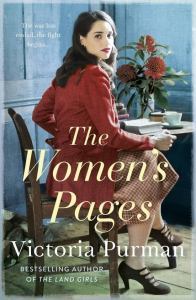
From the bestselling author of The Land Girls comes a beautifully realised novel that speaks to the true history and real experiences of post-war Australian women.
Sydney 1945: The war is over, the fight begins.
The war is over and so are the jobs (and freedoms) of tens of thousands of Australian women. The armaments factories are making washing machines instead of bullets and war correspondent Tilly Galloway has hung up her uniform and been forced to work on the women’s pages of her newspaper – the only job available to her – where she struggles to write advice on fashion and make-up.
As Sydney swells with returning servicemen and the city bustles back to post-war life, Tilly finds her world is anything but normal. As she desperately waits for word of her prisoner-of-war husband, she begins to research stories about the lives of the underpaid and overworked women who live in her own city. Those whose war service has been overlooked; the freedom and independence of their war lives lost to them.
Meanwhile Tilly’s waterside worker father is on strike, and her best friend Mary is struggling to cope with the stranger her own husband has become since being liberated from Changi a broken man. As strikes rip the country apart and the news from abroad causes despair, matters build to a heart-rending crescendo. Tilly realises that for her the war may have ended, but the fight is just beginning.
My Thoughts:
Victoria Purman has really carved a niche out for herself, crafting engaging and quality stories about life in Australia during the mid-20th century. Her novels have a lot of social history woven into them, all the details about life, small and large, that create an atmosphere akin to stepping back in time.
The Women’s Pages covers a lot of ground and touches on a lot of issues. It’s quite a long novel too and I felt it wore its research a bit too heavily in the first half, likewise, it dove frequently into backstories, at times mid conversation, resulting in an adverse effect on the flow of the narrative. I struggled to pin down the actual story for a good portion of the first part of the novel. I did find this ease though once I was into the second half and I was a lot more engaged with the characters and their stories from then on.
As a qualified journalist myself, I found Tilly’s working life and everything to do with the reporting of the war utterly fascinating. That was the real winning storyline for me within this novel. What women have had to put up with, it defies belief. The loss of life from WWII, the POWs, the PTSD, the way in which wives and widows were treated post war; Victoria Purman paints a vivid picture of Australia within that era. Recommended reading for anyone with an interest in post-war Australian social history.




Thanks is extended to Harper Collins Publishers for providing me with a copy of The Women’s Pages for review.
About the Author:
Victoria Purman is an Australian top ten and USA Today bestselling fiction author. Her most recent bestseller, The Land Girls, was published in April 2019. The Last of the Bonegilla Girls, a novel based on her mother’s post-war migration to Australia, was published in 2018. Her previous novel The Three Miss Allens became a USA Today bestseller in April 2019. She is a regular guest at writers festivals, a mentor and workshop presenter and was a judge in the fiction category for the 2018 Adelaide Festival Awards for Literature.
To find out more, visit Victoria on her website.
You can also follow her on Facebook, Instagram and Twitter.
[image error]
The Women’s Pages
Published by HQ Fiction – AU
Released 2nd September 2020
The Week That Was…
We’re at the start of a new week and this is a couple of days past when I normally reflect, but that’s the kind of week last week was. Enough said!
~~~
Joke of the week:
[image error]
~~~
Book of the week:
[image error]
~~~
What I’ve been watching:
[image error]
Loved this gorgeous and deeply moving film so much! Streaming on Stan.
~~~
After 15 seasons, where I’ve been watching from the start, I’m not ready for this:
[image error]
~~~
What I’m reading right now:
[image error]
I couldn’t decide (again) so this is my reading pile for the next week or two.
~~~
Until next week… 

